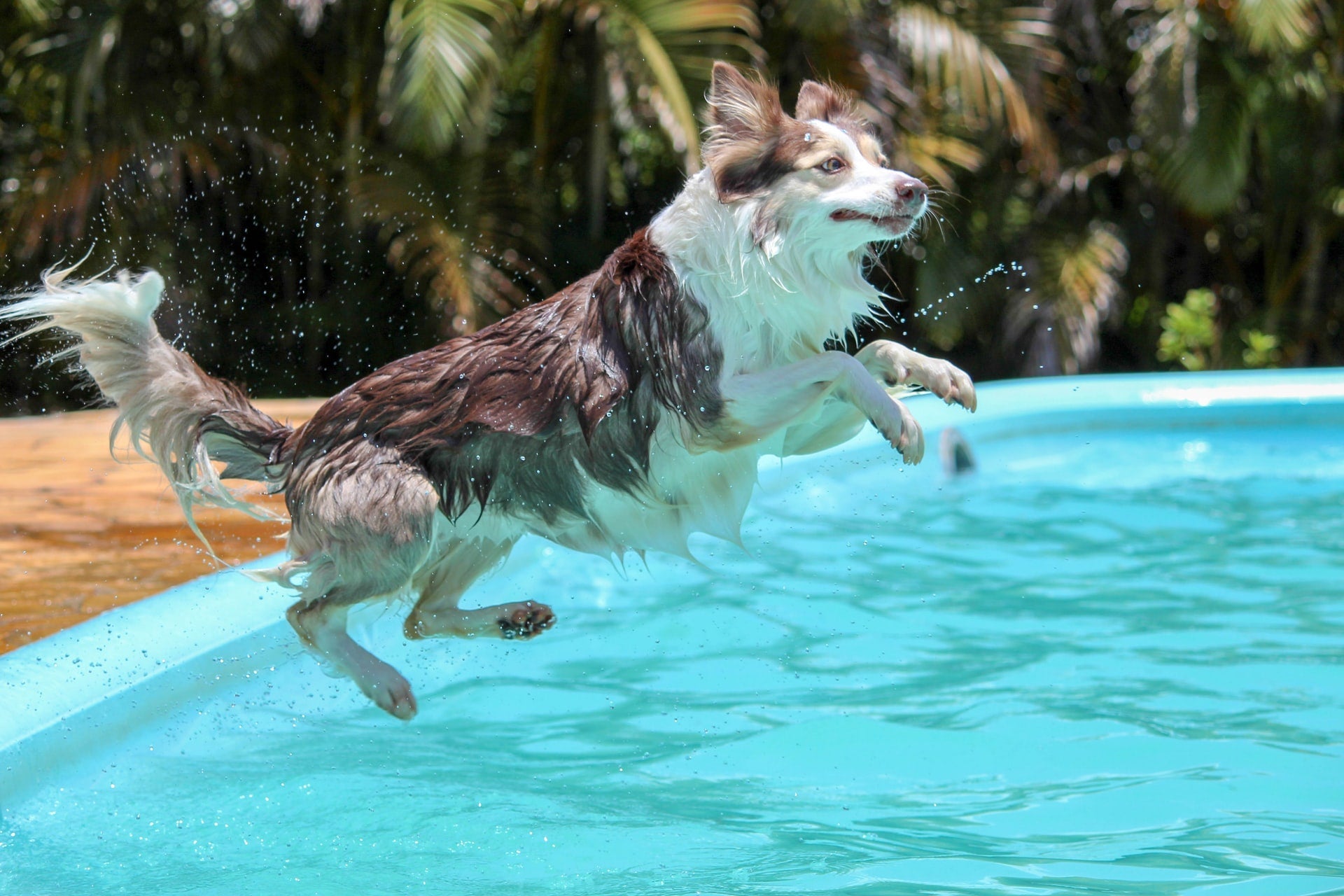The dog days of summer are here, and that means fun outdoor activities with our dogs! However, with increased summer activities, come a whole new set of risks for our furry family members. From dehydration to animal attacks, it's important to be aware of the dangers that pets face during the summer months.
In this blog post, we'll discuss 5 common summer pet emergencies and how to avoid them. Armed with this knowledge, you'll be able to enjoy fun activities like swimming, barbecuing, and hiking while keeping your pet safe and sound. So, let's get started!

1) Heat Exhaustion & Heatstroke
One of the most common summer pet emergencies is heat exhaustion, which can quickly lead to heatstroke. Pets can get heat exhaustion from being outside in hot weather for too long, exercising vigorously in the heat, or being left in a parked car.
Signs of heat exhaustion include:
- Heavy panting
- Drooling
- Weakness
- Lethargy
- Vomiting
If your pet is showing any of these signs, move them to a cool, shady area and offer them water to drink. You should also wet their fur with cool water and place a cooling fan near them.
If your pet's condition doesn't improve or they start showing signs of heatstroke (including dizziness, confusion, and loss of consciousness), it's important to seek emergency veterinary care immediately.
It bears repeating: never leave your pet in a parked car, even for just a few minutes, even if you are parked in the shade! The temperature inside your vehicle can rise almost 20℉ in just ten minutes, and cracking the windows makes no difference.
If your pet will be spending time outside, make sure they have access to shade and fresh water at all times. On hot days, it's best to stick to short walks or play sessions in the yard rather than going for a run or hike. You should also exercise your pet in the early morning or evening when it's cooler outside.
Finally, remember that pavement and blacktop can get incredibly hot during the summer months, making them painful for your pet to walk on. If it's too hot for you to keep your hand on the pavement for more than a few seconds, it's too hot for your pet to walk on.
2) Dehydration
During the hot summer months, it's vital to keep an eye on your pet's hydration levels. Dehydration can occur when pets lose more fluids than they're taking in, and it can happen very rapidly in hot weather.
Signs of dehydration include:
- Excessive panting
- Lethargy
- Dry mouth
- Sunken eyes
- Loss of appetite
If your pet is displaying any of these signs, offer them water to drink and contact your veterinarian immediately.
You can avoid dehydration by making sure your pet always has access to fresh, clean water. On hot days, you may also want to increase their water intake by adding a little bit of low-sodium bone broth or chicken broth to their bowl.
If you'll be spending time outdoors with your pet, always bring along a collapsible water bowl and water for them to drink. And, if you're going to be hiking or doing any other strenuous activity in the heat, make sure to pack extra water for both you and your pet.
Consider using other products that help keep you pet cool, such as cooling mats or cooling vests.
Finally, remember that dehydration can lead to heat exhaustion and heatstroke, so it's important to act quickly and seek medical attention if your pet's condition doesn't improve.
3) Drowning
Another summer pet emergency to be aware of is drowning. Pets can drown in swimming pools, lakes, ponds, and other bodies of water if they're not properly supervised.
Signs that your pet may be drowning include:
- Panic
- Gasping for air
- Frantic paddling
- Struggling to keep their head above water
If you see your pet displaying any of these signs, make sure to act quickly and get them out of the water.
You can avoid drowning by never leaving your pet unattended around bodies of water. If they're going to be swimming, make sure you're there to supervise them at all times.
It's also a good idea to invest in a pet life jacket if your furry friend likes to swim. That way, if they do get into trouble in the water, they'll have a much better chance of staying afloat until you can get to them.
Lastly, remember that even if your pet is a strong swimmer, they can still drown if they get tired or are caught in an undertow. So, it's always best to be vigilant and never let them out of your sight when they're near water. Check out our guide on water safety for dogs for more practical tips to keep your pup safe.
4) Insect Bites & Stings
Summer is also the time when insects are out in full force. And while most insect bites and stings are just annoying, some can be serious and even life-threatening. Even though your pet is covered in fur, they are most commonly stung in vulnerable areas such as nose, muzzle, mouth, or ears.
Signs that your pet may have been bitten or stung include:
- Sudden yelping, pawing at their face, rubbing their muzzle on the ground, or running in circles
- Swelling
- Redness
- Pain
- Itching
Some dogs are more sensitive to stings than other, but in more serious cases, your dog’s muzzle, head or neck area will swell noticeably. Contact your veterinarian as soon as possible if your pet is displaying any of these signs. For non-emergency stings, you can give Benadryl at a does of 1 mg (milligram) per pound of body weight. Homeopathic remedy, Apis 200c is also good for bee stings and allergic reactions.
You can avoid insect bites and stings by keeping your pet away from areas where insects are likely to be, like tall grass or flowers. You may also want to consider using a natural insect repellent on your pet, especially if you'll be spending time in an area where insects are known to be a problem.
Some insects, like bees and wasps, can cause an allergic reaction that can be life-threatening. So, if you're at all worried that your pet has been bitten or stung by a poisonous insect, don't hesitate to contact your veterinarian.
5) Animal Attacks
The final summer pet emergency on our list is animal attacks. This may not be the first thing that springs to mind when you think of summer. But animal attacks often happen at this time of year because many pets spend more time outdoors during the warmer months.
Your canine companion is more likely to be bitten by another dog than any other type of animal, so always be extra vigilant when they're around other dogs. If you're at a dog park or beach, make sure they're supervised and kept on a leash at all times.
You should also be aware of the possibility of wild animals attacking your pet. Coyotes, snakes, cougars, raccoons, and other animals can pose a serious threat to your furry friend, so it's important to keep them away from areas where wild animals are known to live.
If you have a small pet, you should also be aware that hawks and other birds of prey can pose a danger to them. So, if your pet likes to spend time outdoors, make sure they're supervised at all times or kept in a secure enclosure to avoid any potential attacks.
As a rule, never leave your dog outside alone and unsupervised. That being said, there are several products designed to help protect your pet from animal attacks.

Fiona in her Birds of Prey Away Protective Jacket
These products include protection vests or deterrents to prevent birds of prey from going after your small dog, for example:
Prey Protective Jacket on Etsy
Stay Safe With Your Pet This Summer!
Summer is a great time to enjoy the outdoors with your furry friend. But it pays to be aware of the potential dangers that come along with warm weather. By following these tips, you can help keep your pet safe and avoid any summertime emergencies.
Enjoy the summer with your four-legged friend, and have a happy and safe season! Wondering how to keep your pet cool this summer? Discover 8 ways here!



